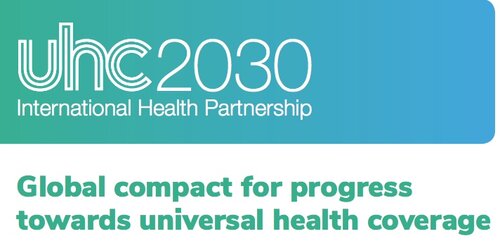Global health leaders and stakeholders gathered in Berlin last...
15 July 2019
Six new signatories to the Global Compact for progress towards UHC.

UHC2030 warmly welcomes six new signatories to the UHC2030 Global Compact for progress towards UHC. Ukraine, Switzerland, World Medical Association, World Heart Organization, Humanity and Inclusion (formerly Handicap International) and the International Council of Nurses are now members of UHC2030, and we look forward to working collectively in our multi-stakeholder endeavours to make progress towards UHC.
The official signing ceremony took place at the edges of the 72nd World Health Assembly in Geneva, and each new member gave a speech demonstrating their commitment to take action according to the principles contained within the Global Compact for progress towards UHC, which are:
- Leaving no one behind: a commitment to equity, non-discrimination and a rights-based approach
- Transparency and accountability for results
- Evidence-based national health strategies and leadership, with government stewardship to ensure availability, accessibility, acceptability and quality of service delivery
- Making health systems everybody’s business – with engagement of citizens, communities, civil society and private sector
- International cooperation based on mutual learning across countries, regardless of development status and progress in achieving and sustaining UHC and development effectiveness principles.
Here are some statements from the event:
Nora Kronig Romero, Ambasador for Global Health, Switzerland said, “To improve the quality delivered to all patients under all circumstances while ensuring sustainable financing of health care systems is the key challenge to achieve and strengthen UHC at the global level by 2030. The multi-stakeholder platform and advocacy efforts by UHC2030 allow for an informed exchange of best practices and pools the political commitment around health systems strengthening for UHC.”
Dr. Leonid Eidelman, President of World Medical Association said, "The endeavour for universal health coverage is key to reaching the ‘triple billion’ targets, and thus the major activity towards achieving SDG 3. The World Medical Association embraces the concept wholeheartedly, and we are keen to see quality primary Ccare provided by multi-disciplinary teams at the core of strong and comprehensive health care systems. In our view, UHC is the biggest step forward ever made by WHO, and we are firmly part of the movement.”
Ms. Petra Schroeter, Director of Institutional Relations and Funding at Humanity and Inclusion (formerly Handicap International), highlighted the important role of a global movement like UHC2030 in translating concept of “leave no one behind” into reality. “The UHC2030 global movement has the leverage to accelerate progress towards stronger health systems and to translate the ‘leave none behind imperative’ in reality. Therefore, we are honoured to join UHC2030 and we look forward to working with other committed partners in taking forward this important agenda. The main objectives of UHC2030 and Global Compact principles reflect Humanity & Inclusion’s mission of working alongside persons with disabilities and vulnerable populations, while offering support to States and international actors for more inclusive policies and programmes, also in the health sector,” she said.
Mr. Jean-Luc Eiselé, Chief Executive Officer World Heart Federation said, “We believe in a world where heart health for everyone is a fundamental human right and a crucial element of global health justice. To make that world a reality, we must work together with partners from across the public health space, as well as the private sector, academia, and government, to achieve universal health coverage.”
Dr. Ulana Supurn, Acting Minister of Health, Ukraine, said, "In mid 2016, no one believed that a country like Ukraine with such limited resources and a Soviet-style medical system would make a quick leap towards UHC. But in three years we have reoriented our medical system 180 degrees and introduced the principle of guaranteed services. How did we do it? Instead of thinking about how to reform 1,500 Soviet hospitals with a GDP growth of 2%, we put the limited funds available to us in what we already had and where people could get 80% of help needed. We introduced market principles and required that the primary care facilities become non-profit corporations. In less than a year, 100% of public facilities changed their status. As a result, they began to raise salaries and improve services. We gave people the choice to choose their own doctor, and after a year, 28 million did so, and 76% were satisfied with their choice. Progress is already obvious, and UHC will continue to be applied at all levels of care starting in 2020."
Annette Kennedy, President of the International Council of Nurses (ICN) said, “The International Council of Nurses is pleased to be joining UHC2030, which showcases a robust global collaboration across multiple sectors and stakeholders to bring a unified and concrete action to achieving UHC. ICN considers UHC as one of its strategic priorities and has been an active partner of the global health community in advocating for UHC through strengthening of primary health care (PHC). Nurses are equipped to ensure successful implementation of PHC and are the principal group of healthcare workers providing PHC across different settings. Working closely with our national nurses’ association members, we are committed to take the agenda forward at all levels.”
Resources
The UHC2030 Global Compact for progress towards UHC is available in these languages:
English
French
Spanish
Portuguese
Chinese
Russian
UHC2030 Joint Vision Paper:
Healthy systems for universal health coverage - a joint vision for healthy lives
The Executive Summary of the Joint Vision paper is available in these languages:
